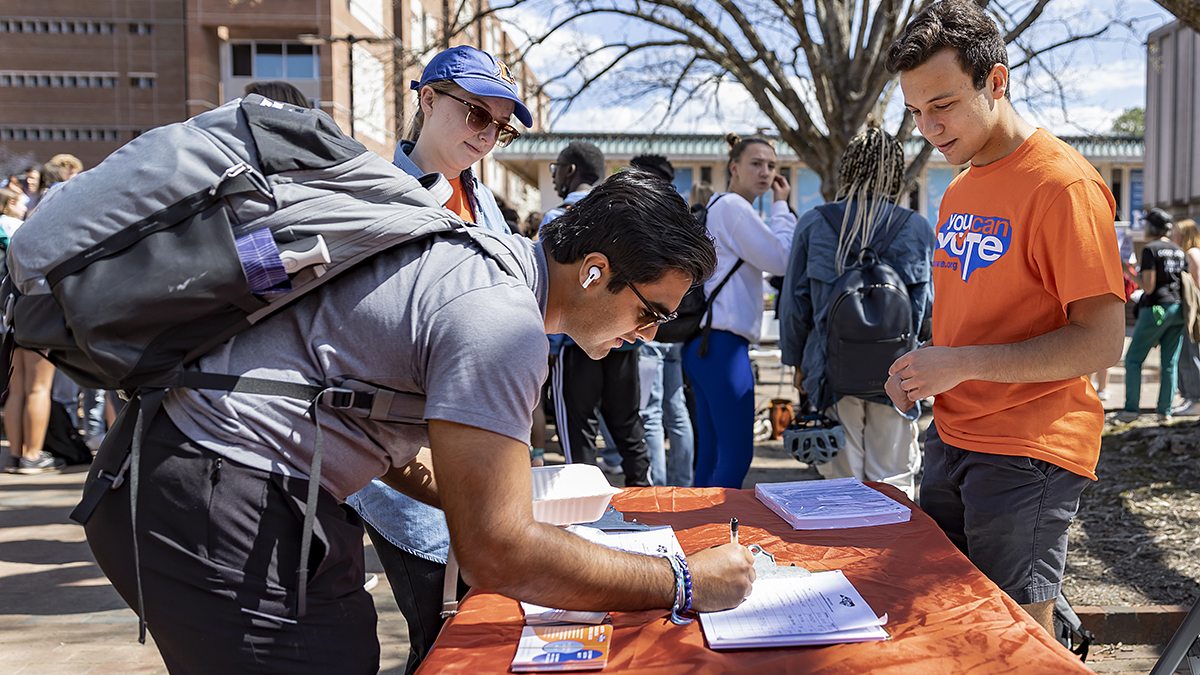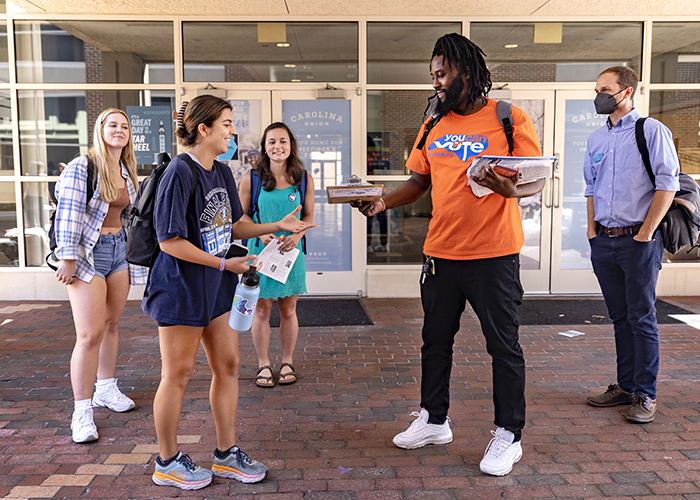Promoting democracy critical to Carolina’s mission
One initiative, Carolina Votes, provides the community with the tools to be informed and engaged participants in government.

The first objective in the Promote Democracy initiative of the University’s strategic plan, Carolina Next, is to “Actively engage as diverse citizens responsible for the institutions of American democracy.” Staff, faculty and students are doing that through Carolina Votes, a robust effort to coordinate with campus partners on voter registration and voter education.
Sam Hiner, a sophomore public policy major, leads voter engagement activities on campus as a member of the student-led Civic Engagement Working Group. Until a few months ago, Hiner wondered: Where can I see Carolina’s commitment to voter engagement?
He and other students were pleased to learn that the commitment has top billing in Carolina Next. They and others are turning the commitment into action through the University’s increasing activities and programs to register and educate voters.
Promote Democracy begins with a focus on students: “As a leading global, public research university, we play a key role in the exchange of ideas and the education of informed citizens.” That portion ends by confirming “Carolina’s pledge to support and improve democratic citizenship in the state, the nation and around the globe.”

In September, the Promote Democracy Initiative and the Carolina Center for Public Service held a training session for student volunteers on registering new voters on campus. After the session, trainer Jarrod Horsey of You Can Vote talks with volunteers Grace North, Amanda Leder and Grace Parker as Ryan Nilsen, a co-lead on the Carolina Votes effort, looks on. (Johnny Andrews/UNC-Chapel Hill)
“The 18-24 age group has traditionally had the lowest rates of voter turnout and engagement in the democratic process. A goal of the Carolina Votes initiative is to provide the Carolina community with the tools they need to be informed and engaged participants in American democracy,” said Jason Roberts, the Promote Democracy captain and a professor in the College of Arts and Sciences’ political science department.
Carolina Votes co-leads are Ryan Nilsen, senior program officer for community engagement at the Carolina Center for Public Service, and Bobby Kunstman, the Carolina Union’s director of student life and leadership. They convene a group of administrators and faculty focused on election engagement, Nilsen said.
“Historically, with UNC’s strong emphasis on student leadership, student activists and student governance, students drove a lot of the voter registration and engagement work. In recent years, different offices around campus have seen how that falls short at points and have started to take more aspects of that on within their purview,” Nilsen said. “The benefit of Carolina Next specifically naming it as a priority gives us a reason to meet regularly and organize so that we aren’t doing the same things in different places or leaving big holes.”
Hiner said that the initiative has been a great way to energize students before voter registration closes Oct. 14 for Nov. 8 statewide general elections. After Oct. 14, only same-day registration is available during the early voting period.
Carolina Votes is leveraging all sorts of efforts, including:
- Training student-led voter registration through sessions sponsored by Student Life and Leadership.
- Creating a coordinated calendar for voter registration activities.
- Organizing through a rubric from the Atlantic Coast Conference’s DemocrACCy Civic Challenge to align good practices in University-wide communications, voter registration and education and campus visits by elected officials or candidates. “The rubric helps make sure somebody is thinking about each element,” Nilsen said.
- Increasing campus and local community communications under the direction of Kristen Young, director of community relations.
- Facilitating a partnership between the Carolina Center for Public Service and You Can Vote, a Durham independent nonprofit organization, to train voter-registration volunteers and organize a voter registration day during the University’s Engagement Week.
- Supporting forums, such as a School of Law event with Orange and Chatham County candidates for district attorney.
- Using data on student voting collected by the National Study of Learning, Voting and Engagement through Tufts University’s Institute for Democracy & Higher Education to help academic departments with low voter engagement promote registration. “The data focuses on students and enables us to track, sometimes at a granular level by academic discipline, who’s voting and who’s not, who’s registered and who’s not,” Nilsen said. “It’s one of the ways that we track voter participation and the success of some initiatives. We saw a huge uptick in 2020 compared to other election years.”
- Promoting the Chapel Hill Peoples Academy in which students can learn about town government and gain leadership skills. It exposes students to ways citizens can be involved and to internships or jobs with democracy-related organizations.
- UNC Athletics educating its 800 student-athletes on the importance of registering and voting in elections and partnering with the Campus Y to promote voter registration to the general public at select events.
- Sending a student contingent to the annual North Carolina College Voter Summit to share and learn how other campuses engage voters.
“We were surprised and excited to see the Promote Democracy initiative in Carolina Next as an entire pillar,” said Hiner, who is executive director of the North Carolina Young People’s Alliance, a nonprofit with teams working at universities across North Carolina to mobilize students and build youth power. “It serves as a beacon for students at the University and beyond to show this is something we care about and, even if things move slowly at times, it’s a North Star that helps us be more effective.”
How to vote: Students registered at an on-campus address may vote on election day at the Stone Center. Students who wish to register and vote in Orange County may use the early voting site at the Chapel of the Cross, 304 E. Franklin St.




